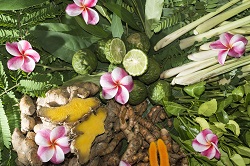Nanotech-enhanced Ayurveda for healthier food
In Europe, Ayurveda is considered as a pseudoscience. But even though evidence is lacking to support its scientific claims, some of the ingredients at the heart of the Ayurveda diet have gathered some scientific attention for their assumed virtues. According to Prof. Ian Norton, Chemical Engineer at the University of Birmingham, some of these ingredients – which he calls Ayurvedic bioactive compounds (ABC) – deserve rigorous scientific investigation to see whether they could help control chronic health problems such as obesity. This begs an important question: If they have so much potential, how come ABCs have not been integrated into our food? Prof. Norton says there are three main reasons for this. The first is a lack of sufficient scientific research and safety studies to tailor Ayurveda ingredients to European foods, which are in fact very different from Asian ones, along with the difficulty in obtaining approval from concerned authorities. Then comes the issue that the addition of Ayurveda compounds will change the organoleptic property of food. To put it simply, Ayurveda-enhanced food will become more spicy and sour than what most European consumers can handle. Finally, there is the way we make food here in Europe. “Unlike Asian countries where people cook food daily, Europe and other developed countries use more industrially-processed food products which have a longer shelf life. This extended storage time means that there is a greater chance of losing the properties and benefits of these compounds.” This is particularly problematic, as Ayurveda compounds are notorious for their instability. They are sensitive to light, temperature, pH or oxygen, which means that adding them to industrially-processed food would require an innovative delivery technology. According to Prof. Norton and his team, nanotechnology might be just the candidate, as it can increase the stability, bioavailability and acceptability of these Ayurveda compounds. “Nanoparticles can be used to encapsulate sensitive bioactive compounds within nano-compartments to protect them from degradation due to exposure to heat, light, oxygen, etc. Similarly, in the gastro-intestinal tract, these nanoparticles can be used to increase the bioavailability of Ayurvedic compounds by increasing their dissolution velocity in biological fluids, cellular uptake and stability. Furthermore, nanoparticles entrapment can be used to mask the unwarranted change in the food products' organoleptic properties.” This so-called “nanocrystals technology” was the core focus of the NSEF (Nano Structured Emulsion Foods) project. Thanks to EU funding, the team aimed to fabricate ABC nanocrystals as well as use these nanocrystals as edible pickering particles to control emulsion functionality. “In general, nanoparticles (both amorphous and crystals) are fabricated by using a bottom-up approach, a top-down approach or by combining the two. In our study, we used a bottom-up approach to fabricate nanocrystals of curcumin,” Prof. Norton explains. Although these nanocrystals have yet to be incorporated into real food products, the preliminary results were satisfactory and the team is now hoping to move forward, boosted by interest from various players in the food processing industry. “We are currently looking for funding to further explore the feasibility of using Ayurveda for the benefit of European citizens and also an industrial collaboration to take our research beyond academic pursuit,” Prof. Norton concludes.
Keywords
NSEF, nanotechnology, Ayurveda, compounds, food, emulsion, curcumin, nanoparticles, nanocrystals



